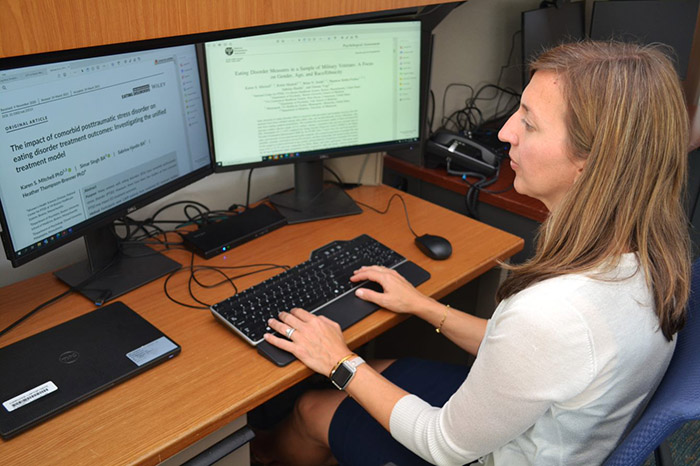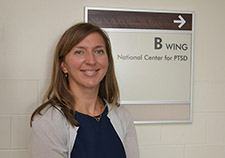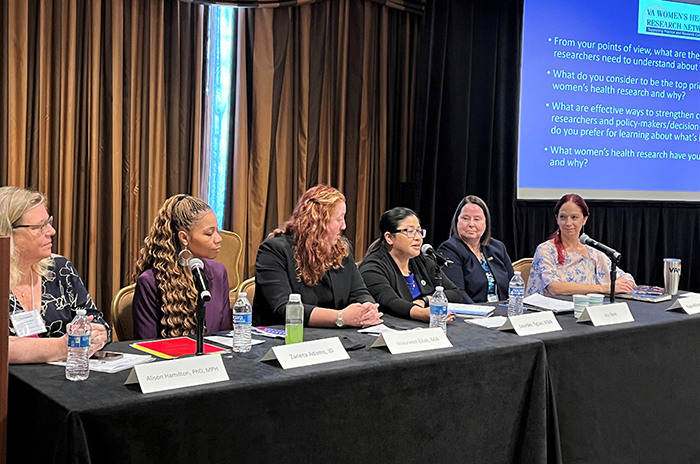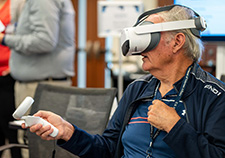Office of Research & Development |
 |
Office of Research & Development |
 |


Dr. Karen Mitchell, a clinical psychologist, led the study, which focused on a psychotherapy that addresses problems with emotions that are relevant to many mental disorders. (Photo by Win Danielson)
August 30, 2021
By Mike Richman
VA Research Communications
"Future studies should investigate the impact of eating disorder treatment on PTSD symptoms in order to determine the need for integrated treatments for these comorbid conditions."
A new study exploring how PTSD may impact treatment outcomes for women with eating disorders suggests an emotion-based psychotherapy is a promising treatment for patients with or without PTSD.
The psychotherapy, known as the Unified Treatment Model (UTM), addresses problems with emotions that are relevant to many mental disorders. It helps patients improve motivation to engage in both PTSD and eating disorder treatment, to become aware of their emotions without labeling them as “good” or “bad,” to think more openly, to reduce avoidance of negative emotions, and to tolerate the physiological aspects of emotions, such as sweating and increased heart rate.
The UTM also focuses on learning to accept the shape of one’s own body and on exposure to feared or forbidden foods.

Mitchell is affiliated with the Women's Health Sciences Division at the National Center for PTSD. (Photo by Win Danielson)
Dr. Karen Mitchell, a clinical psychologist at the VA Boston Healthcare System, led the study, which appeared in the International Journal of Eating Disorders in July 2021. Nearly 3,000 patients who were treated with the Unified Treatment Model at The Renfrew Center eating disorder facility in Philadelphia agreed to let Mitchell and her team access their data.
Through the data, the researchers investigated whether PTSD diagnosis at admission was linked to changes in eating disorder examination scores, binge eating, self-induced vomiting, and eating restrictions across three time points, as well as clinically significant improvement and treatment dropout. According to the findings, 65% of the patients showed improvement in symptoms from admission to discharge, based on their eating disorder examination questionnaire scores.
“Although PTSD diagnoses were associated with higher eating disorder symptom levels at admission, PTSD was not associated with worse treatment outcomes, suggesting the UTM is a promising treatment for patients with and without PTSD,” the researchers write. “Future studies should investigate the impact of eating disorder treatment on PTSD symptoms in order to determine the need for integrated treatments for these comorbid conditions.”

VA Researcher Named One of U.S.’ Top Female Scientists

2023 VA Women's Health Research Conference

Self-harm is underrecognized in Gulf War Veterans

Virtual reality technology helps Veterans in pain
Eating disorder questionnaire scores and symptoms increased from discharge to six-month follow-up. But Mitchell did not find that alarming.
“It’s fairly common that symptoms will increase somewhat in the longer term relative to symptom levels immediately following treatment,” she says. “In this case, patients were enrolled in a residential treatment, which is a highly structured environment. Leaving that structure and having to apply skills learned in treatment to real life can be challenging. Symptoms at the six-month follow up were still lower than they were at admission before treatment, which is encouraging as far as long-term success of the UTM.”
The Renfrew Center created the Unified Treatment Model. It’s a modified version of the Unified Protocol, a form of cognitive behavioral therapy for people diagnosed with depression, anxiety disorders, and emotional problems.
Officials at The Renfrew Center also considered cognitive behavioral therapy for eating disorders and family-based therapy to treat their residents. But they chose the UTM thinking it would be better therapeutically to address their patients co-occurring health conditions, according to Mitchell. Two studies have found that patients treated with the Unified Treatment Model at eating disorder facilities improved considerably in factors reflecting aspects of emotion avoidance and emotion regulation from admission to six months post-discharge, compared to patients treated prior to the implementation of the UTM.
The patients were enrolled at Renfrew for an average of 32 days and stayed at the facility during the period. Meals and snacks were supervised. The patients took part in group and individual therapy UTM sessions, as well as individual sessions with dieticians and psychiatrists for medication management. Treatment also included structured daily activities.
Mitchell was somewhat surprised by the results of the study.
“I thought that treatment outcomes would be worse for patients with PTSD, based on other studies,” she says. “In the Renfrew sample, though, patients with PTSD had higher levels of eating disorder symptoms prior to treatment, but they did not have worse outcomes compared to patients without PTSD.”
Mitchell is one of VA’s top experts on how psychiatric conditions, including PTSD and depression, affect people with eating disorders. To date, there are no specific treatments that address co-existing eating disorders and PTSD, nor are there clear guidelines about whether they should be treated together or sequentially and, if so, in what order. Rates of PTSD among people with eating disorders are as follows:
All three of those eating disorders are considered psychiatric conditions.
“Many women and men with eating disorders also have histories of trauma and PTSD,” Mitchell explains. “No psychotherapies for eating disorders really address co-existing psychiatric conditions. We have limited evidence that eating disorder patients with trauma histories and-or PTSD don’t do as well in treatment. But this has only been investigated in a handful of studies.
“I wanted to examine this in the Renfrew data to answer the question of whether patients with PTSD diagnoses had worse treatment outcomes with respect to their eating disorders,” she adds. “My hope was that the findings would be useful for developing treatments for comorbid PTSD and eating disorders that improve the way we treat these disorders when they co-occur.”
Previously, Mitchell led a study on the theoretical link between PTSD and eating disorders. The studies reviewed in the paper suggested two major areas of research. They included a long-term study using a comprehensive eating disorder assessment to better highlight the link between eating disorders and PTSD and a study to experiment with certain therapies.
Those suggestions influenced the approach she took in her empirical study. “In particular, I sought out collaboration with Renfrew because of the need to further investigate whether and how PTSD might impact eating disorder treatment outcomes and what treatments might effectively address both conditions,” she says.
In the near future, Mitchell hopes to lead a randomized controlled trial that further examines the Unified Treatment Model as a therapy for PTSD patients with eating disorders. Participants would be randomized to the UTM or to a more established treatment for eating disorders, such as cognitive behavioral therapy, to determine which one is more effective at treating patients with both conditions.
She hopes to submit a grant request for the study later this year.
VA Research Currents archives || Sign up for VA Research updates